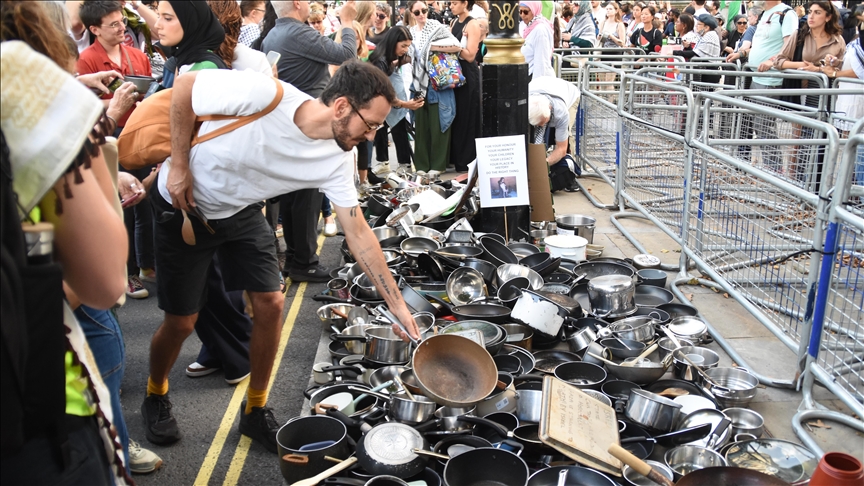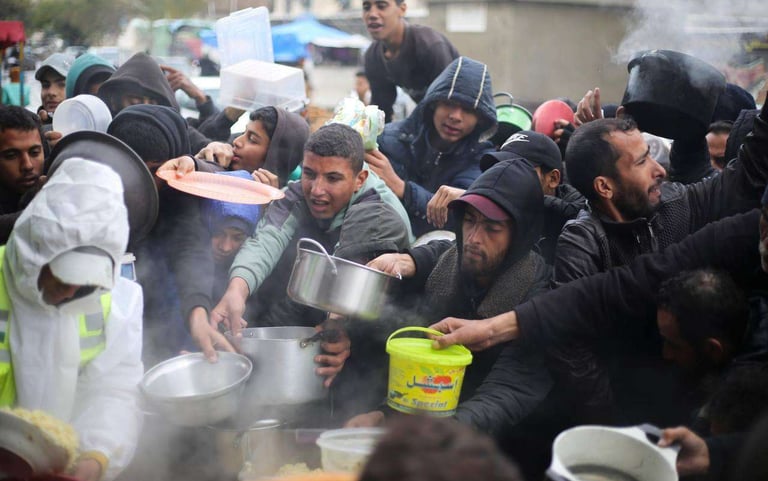1,000 Pots Line Downing Street as Starvation Crisis in Gaza Sparks Outcry
A surge of outrage swept central London as thousands gathered outside 10 Downing Street, demanding urgent action for Palestinians suffering in Gaza. Protesters placed 1,000 empty pots on the pavement a silent tribute to those who have died from hunger in the besieged enclave. The sound of clanging pots echoed across Whitehall as demonstrators mourned the escalating death toll from starvation and violence.
INTERNATIONAL
Thinkbrief
7/29/20252 min read


The protest, organized by the Palestine Solidarity Campaign alongside advocacy groups, embodied both grief and mobilization. Palestinian flags billowed, signs urged a ceasefire, and speakers denounced the mounting humanitarian crisis as a manmade famine. Many accused Israel of using starvation as a weapon and condemned the UK government’s military and diplomatic support for Israel, even as international agencies voiced alarm.
Since October, Gaza’s already fragile infrastructure has collapsed under relentless bombardment. Israel’s blockade, active since 2007, intensified recently, forcing aid convoys to move through barren, devastated neighborhoods. The United Nations and World Food Programme report mass displacement of civilians, severe malnutrition, and at least 122 deaths from starvation—among them 83 children. Many in London referenced an International Criminal Court investigation into possible war crimes involving the use of starvation as a military tactic, which is forbidden under international law.
Controversy surrounds a new Israeli-administered aid system meant to bypass the United Nations. Human rights organizations and the UN reject this approach, calling it dangerous and insufficient. More than 800 Palestinians reportedly died while queuing at food distribution points in the last two months, according to medical officials and aid workers on the ground. Hospitals have closed, and local doctors share harrowing stories of children left without food, formula, or medicine.
Outside the prime minister’s office, testimonies painted a grim reality. “This is a humanitarian catastrophe. No one is stopping it. We’re watching genocide unfold, and our government is complicit,” one protester said. An aid worker recounted colleagues in Gaza so malnourished they could barely stand as they struggled to distribute supplies.
The demand for accountability grew louder throughout the demonstration. International agencies and British lawmakers have condemned Gaza’s suffering and the UK’s lack of decisive action. In a recent joint statement, 28 nations, including the UK, urged Israel to end what they called the “gradual provision of assistance and the inhumane killing of civilians” seeking basic necessities.
Amid mounting scrutiny, the UK government announced plans to begin airdropping aid and evacuating children in need of specialized care. Humanitarian groups called these steps inadequate, criticizing them as cosmetic gestures while the crisis deepens.
As the demonstration ended, 1,000 empty pots remained on Downing Street—a stark rebuke to political leaders and a powerful reminder of the urgency in Gaza. Hopes for meaningful change endure, but for many affected, help has come too late. The rally underscored both the sorrow for lost lives and the growing demand for justice and decisive intervention.

